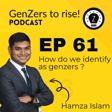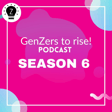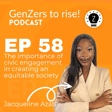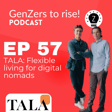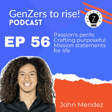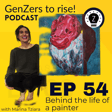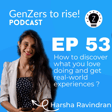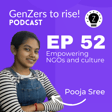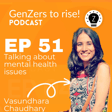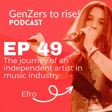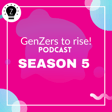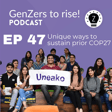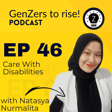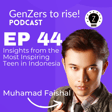Become a Creator today!Start creating today - Share your story with the world!
Start for free
00:00:00
00:00:01

Breaking Stigma: Mental Health Awareness Month with Nancy Bosnoian
Every May is mental health awareness month and we have to celebrate for that. On this special episode we are talking with Nancy Bosnoian, the founder and executive director of End No Sleep, a nonprofit focused on preventative mental health education.
We dive into mental health definition, ways to improve it, as well as how GenZ is taking seriously the importance of having a good mental health. Nancy also shares insights and advices.
You can connect with Nancy Bosnoian at https://lnkfi.re/nancy-bosnoian
Follow GenZers to rise! https://go.changemakerz.org/follow
Episode's page https://podcast.changemakerz.org/nancy-bosnoian
Access exclusive content on the ChangemakerZ app at https://app.changemakerz.org
Produced by Vasilis Skarleas
Transcript
Introduction to Change Makers Team
00:00:01
Speaker
Hello everyone, I'm Saloni. And I'm Vassilis. We run Change Makers team, a student room initiative that aims to empower, educate and connect Gen Zers interested in entrepreneurship. We interview teenagers with impactful projects and create resources to help you change the world. If they can't do it, so can you.
00:00:23
Speaker
On this podcast, we discuss logistics of creating different types of projects with Gen Zers who have already done it. We will leave our social media and website information in the description.
Special Episode Announcement for Mental Health Awareness Month
00:00:44
Speaker
Welcome, everybody, to another episode of the Dancer's Rise podcast. We are here today for a very special episode since it's Mental Health Awareness Month.
Guest Introduction: Nancy Busnoyen from NNOSleep
00:00:54
Speaker
With me in the studio is Nancy Busnoyen, founder and executive director of NNOSleep, a non-profit focused on preventive mental health education. Welcome, Nancy, to the show. So nice to meet you.
00:01:08
Speaker
Thank you so much for having me. I'm so glad to be here today, definitely for Mental Health Awareness Month, so it's really exciting. It's really, really exciting.
Misconceptions about Mental Health
00:01:17
Speaker
To begin with, we're used to the term mental health, but usually we're lost in the translation of the meaning of that term.
00:01:25
Speaker
I'm saying that because maybe you know sometimes we can see this term around social media channels, announcements of products from the companies like the latest campaign for the Apple Watch fitness program. But I think that most of us, we don't really know what mental health really is. Which are your thoughts on that?
00:01:49
Speaker
I have a lot of thoughts on that. I've been especially recently since the nonprofit had really had a transition. I think an incredible doctor in the field of mental health talks about this and his name is Dr. Daniel Amen.
00:02:11
Speaker
And he talks about rephrasing the term mental health to brain health. I think things that get lost in the transition of mental health is the fact that it is physical. A lot of times when we think about mental health, it's almost non-tangible. But it's the opposite. I mean, your neurons, your thoughts,
00:02:40
Speaker
are physically happening in your brain and through scans, brain scans, you're actually able to see physically what's going on in your mind and I think
00:02:55
Speaker
A lot of times, also, the stigma around the topic comes from being able to say, oh, just think positively, you know. I put that in the top part. Yeah, so I think it's really important to focus on the physical aspect of it.
00:03:16
Speaker
There's so much to be done. Not only think about the result, like positive thoughts, but also how we can reach at this point to have positive thoughts, positive thinking, positive energy and be in a good mental health state.
Self-Awareness and Consistency in Mental Health
00:03:33
Speaker
Yeah, I think it takes a lot of work and it takes also, depending on the person, sometimes professional help or really having a good therapist or a good support system or support group for anybody going through a hard time. I think I recently
00:03:54
Speaker
few months ago, I got into really like a huge healing journey. And I read about Dr. Joe Dispenza's work and take everything with a grain of salt. When you read research, you have to be you have to make sure you're reading who's funding it, etc, to be well aware of the content you're consuming. But I think
00:04:15
Speaker
Reading that it all starts with a lot of self-awareness Going throughout the day and noticing what makes you feel certain ways. So His famous kind of line says neurons that fire together wire together And that's about your thoughts. So the only way to stop a thought pattern is to stop them from firing together so you really have to
00:04:41
Speaker
be consistently working on yourself. So if you find yourself, you know, really thinking about a thought on and on, find the proper ways to rewire that pattern. And a lot of times when you have, you know, if you have a serious diagnosis, then obviously professional help is the way. But if you're just on a healing journey trying to be as healthy and happy and content or even stable, I think is the right word.
00:05:11
Speaker
then definitely self-awareness I think is a great start to realizing what is wrong and how can I better it or improve it.
00:05:20
Speaker
I see, it's like a process that needs to be done like in your mind and see what maybe, I don't know, other things that are going wrong and then we have to find the reason why it's happening that so that you can arrive to a solution and this is a constant process that you need to do in order to have, you know, a better mental health, I think.
Preventive Mental Health Education with NNOSleep
00:05:46
Speaker
While I was researching the subject, I really had to ask what is preventative mental health and how does your organization help with that? Yeah, of course. I think I recently stumbled upon
00:06:07
Speaker
the term in good using that term and the reason for that is is because there's so many organizations out there much needed of course that treat
00:06:19
Speaker
post-diagnosis that treats students after the crisis or when they're having a crisis. And to me, it's really important to how do we stop having these students get into crisis? How do we stop getting diagnosed in the first place? What are things that we can do to improve their health
00:06:43
Speaker
prior to you know going into the dark hall and you know having all this care because of course sometimes it's inevitable but a lot of times it is preventable in terms of you know students don't get enough sleep.
00:06:58
Speaker
Right? Students, it's so hard to get a good eight hours of sleep when you have early school start times, when you have so much homework, when you are also trying to balance your social life. And there are so many kind of systematic factors that affect that. But the research shows if you go one day without having the proper eight hours of sleep, you are your
00:07:25
Speaker
memory retention span goes down, you're more agitated, you're irritated, your mood just gets worse naturally because you're not getting enough sleep. So this is what happens if you just don't sleep.
00:07:41
Speaker
for one night. So imagine putting students through that over and over again, plus adding the anxiety of having to get into college and, you know, working hard. So preventative care is ways, small tools we can teach students to use that aren't going to take hours of their time. So then they can be aware of different ways to take care of their mind and their body that is actually
00:08:10
Speaker
obtainable and sustainable. This is so so so important and I wish I could as a person had found a balance between you know being stressed and burned out while you know there are moments that I don't have any of these things but most of the time I am burned out and I'm stressed maybe because
00:08:37
Speaker
I have confidence and on the next time I don't have confidence myself I think that this is going to be the worst thing that will happen maybe on an exam or for results or I don't know what could provoke all this stress maybe because
00:08:55
Speaker
While I was growing up, and maybe it's the same for other people, I was trying not to follow a specific path, but I had some goals, and these goals needed a check next to the checkbox. So when you're trying to achieve all of these things, in the end you forget that there is also someone else. This person is you that you have forgotten
00:09:22
Speaker
You have forgotten maybe to maintain him, to be in a good health, to be in a good mental health. And we should never forget that. And so having really preventative mental health, I think this is a great tool and thanks so much for touching on that, on these tools.
00:09:42
Speaker
Yeah and I wanted to add to what you said because I think that is so important and one thing that through being part of this process that I've learned recently because I've struggled with my mental health immensely
00:09:56
Speaker
which is why I'm a huge advocate for it because I'm kind of was a victim of it for a while and trying to figure out that path. But again, I was so privileged to have a great support system throughout is that when we're trying to achieve goals that are
00:10:15
Speaker
from outside of us that are external, right? When you're trying to grow your podcasts or trying to grow the nonprofit and trying to get good grades at school is like you said, we forget who we are and like to take care of us. But one thing I've learned to stay healthy
00:10:32
Speaker
and to stay balanced is you first have to prioritize yourself rather than the external goals. And that sounds counterintuitive, but if you take time every day for 30 minutes and do one thing that genuinely makes you happy, that could be just spending time with, I don't know, for me, it's like spending time with my dog or going on a
Setting Personal Goals and Achieving Consistency
00:10:58
Speaker
run or going on a walk.
00:10:59
Speaker
Um, instead of doing homework, it will actually give you more energy and momentum to continue with that. And then I think the second misconception throughout this process is, is like, once you're doing well, then it's just straight. You're going to do well all the time. All the time. That's not true. You're, even if you do all the right things, you might have bad days. So that's okay too. And just be patient with yourself.
00:11:26
Speaker
Definitely, definitely. So what should we expect from Gen Z since its mental health awareness month? I think from expect or
00:11:42
Speaker
hopefully like get up what I would like to see or do is having kind of like what we talked about in the beginning of the podcast is really honing down on on the fact that it isn't a separate entity like your mental health isn't separate from your physical health or from your body it's
00:12:06
Speaker
It's one. And closed. Yeah. Yeah. And talking about it with the same importance as people do when they talk about anything that they talk about the physical health. And I think just also being open about experiences, I think sharing storytelling is huge.
00:12:35
Speaker
If we can expect more people to share their stories and be vulnerable with what they've gone through, which is a huge ask because it's hard to do. I think it just keeps creating more spaces. But I also think we're, I'm very hopeful. I think we're on the right track with everything Gen Z is doing with all different kind of crisis that we're in currently.
00:13:00
Speaker
So you're saying that we could be like echo chambers for what's happening inside ourselves and this could inspire people to search what's going on in themselves. And maybe together we could find the solution to our mental health problem. Yeah.
00:13:21
Speaker
Bypassing boundaries and setting new goals is a great way to power up our motivation storage. So what about starting or participating in initiatives? I think it's very different for everybody, but I think setting goals
00:13:38
Speaker
outside of work. But for example, I think maybe for athletes, it would be the opposite. For example, setting goals that I think you think are impossible to achieve. And I wish I will share a personal experience. I started running. So I'm training for a marathon. And that has nothing to do with my work or like my professional life. But
00:14:08
Speaker
Once I hit, I first started with a 5K kind of training for a 5K because I've never ran before in my life. I was so out of shape, was never at the gym or anything like that. And the day I hit the two mile mark, I felt I could achieve anything in my life.
00:14:28
Speaker
And it was just such a serotonin boost and it really showed me that with the proper discipline of just showing up every single day to the run, whether I felt like it or not.
00:14:45
Speaker
give results and that also showed my mind that it taught my mind that oh you know it takes time even in your work because a lot of times I think with social media we expect to do something or maybe it's personal for me and then we see success so quick because we never see behind the scenes so when we don't see that something is like
00:15:10
Speaker
super successful online. It's almost as if the work is not being recognized or it's not working. But the truth is, it takes a lot of time and discipline and consistency. So I think having goals outside of that parameter, whether it be, for example, you want to walk 10,000 steps a day, and then you hit them every single day. And that's insane because that's... So you're setting a new goal.
00:15:37
Speaker
Yeah, you're setting a goal but also an achievable goal that isn't huge but it's also out of your comfort zone because you haven't done it before. So small things like that I think are super helpful and you don't have to, I don't mean to, you don't have to run to two miles if you can't like anything else that genuinely you think you've always wanted to do but we're too afraid to try.
00:16:03
Speaker
That's really, really helpful, I think. And I could try this out. I've never tried this out before. I'm most like you. I'm not a runner. I'm not an athlete.
00:16:17
Speaker
I have specific things that I like to do and I've never thought about getting this way out of my comfort zone. Maybe because I'm already doing things out of my comfort zone. I think that I need time to process all the information before I... I create another goal out of my comfort zone, but it's also achievable at the same time. But I think that this is the idea and it's great.
NNOSleep's Transition to Technology
00:16:48
Speaker
Tell me more about End No Sleep. Are you expecting a release date for your website also really soon?
00:16:59
Speaker
It's been kind of, NOC has been a crazy journey so far. I started it right after I graduated high school and then had worse planning it throughout high school. And recently we completely transitioned. Now we're in tech. We're still a nonprofit though.
00:17:18
Speaker
And we got funding from the Zeezeric Foundation and we got support from, you know, I was a fellow for the Western Union Foundation and then the Clinton Global Initiative University Program. So,
00:17:41
Speaker
All of a sudden we had this project and we got funding for it and we're trying to grow it I think the thing was the mindset was why not use technology to scale impact because we can and Because of that funding we're kind of rebranding a lot of things we're working on and hopefully I think by September You will see
00:18:10
Speaker
a lot of changes. Stay tuned everyone. Yeah. But yeah, it's been really exciting and I can't wait for it to, for the program to launch in high schools and see the impact and try to measure of what we can do to really help students feel better. It's really the stats in the United States are really, really upsetting.
00:18:40
Speaker
to witness and see. So any way we can figure out how to lower these stats with depression, anxiety, and suicide scores, suicide rates, then that's the goal. You talked about technology. So you're thinking about, you know, you're creating an application, you're creating a platform, how is this going to work?
00:19:09
Speaker
So when we first started at NOC, the educational portion of it was either me going in person to different schools or volunteers doing it at their schools or going out of their way to go somewhere else and just do a PowerPoint presentation that we had. And
00:19:36
Speaker
It's not hard to do. It's very much doable, but there's so many obstacles to that because if you're a startup and you're a nonprofit, then you need volunteer insurance because the volunteer wearing your logo representing you could be insured anywhere they go.
00:19:56
Speaker
You have, you know, the physical being the transportation of people. And then with our board members, we're thinking, oh, let's, you know, do the presentations via Zoom. And then we kind of had this mind, the switch of, you know what, why not build an online curriculum?
00:20:15
Speaker
You know, why not build an online curriculum and all we have to do is just send a link to high schools and then clicking it, they're able to access what we're doing. And this makes the process of...
00:20:36
Speaker
serving or educating many more students at a much quicker and faster weight. Um, so I think right now is a great time to use technology, but we also need funding. I mean, we're very lucky that we're able to get funding. Um, and I know that with building these like online platforms, it's, it's not cheap. It's expensive if you want to build a great one. Um, so I think we need to make funding more accessible to
00:21:06
Speaker
nonprofits trying to enter the tech space. Yeah, I understand like it needs time and it's money. Well, it needs you know, a well organized team and also the right people to work with to build such a platform. I'm a programmer. I know part of this, this stuff like I was building platform for about a year.
00:21:32
Speaker
We released about three major updates. We rebranded everything three times. It was an e-commerce site at the moment. And the whole process, talking with investors, talking with the people that they are using, taking the feedback, make sure that everything works. It's not an easy task. For a startup, especially, it's not easy at all.
00:21:55
Speaker
Someone in Europe would like to be staring fingers crossed that everything will be ready to launch on September and see this growth that everybody's raised before. Thank you, I'm excited. So is there anything else you would like to share with us today?
00:22:15
Speaker
Um, I think if I say, if I would say one thing about kind of mental health, um, sleep, preventative care is just that it affects your life in more ways than just your mood. So please
Closing Thoughts on Mental Health Prioritization
00:22:32
Speaker
prioritize it. It can affect your gut health. It can, um, affect like
00:22:41
Speaker
all other parts of your physical health, your migraines, all of that. So make sure to prioritize yourself first. Try to seek help when needed and don't lose hope if you don't heal right away or you don't feel great right away. It takes time. But yeah, I'm so grateful to be here and thank you so much for having me.
00:23:09
Speaker
Alright, thank you so much for being with me today and answering. I think that this marks the end of today's episode. We had such a great conversation about preventative mental health as well as how mental health is important for our lifestyle, what we can do to improve it and how different actions or activities can help us to achieve that goal. It was so great having you on the show. And guys,
00:23:38
Speaker
I have so exciting new show here today with just reached the milestone for our taint makers app. We arrived at approximately 500 installs for the app store and approximately about 14 installs on the Play Store.
00:23:55
Speaker
And I really didn't expect to be that way when we started this project back a year ago. And this means a lot to us, so thank you everybody that installed the Thingy to Make Your Z app. And for those who doesn't know what exactly the Thingy to Make Your Z app is, it's an interactive online app which is available both on iOS and Android devices, on your computer or on your personal tablet.
00:24:20
Speaker
where you can find the latest episodes from Zenko's Make You Z and Zen Decorise Podcast, insights about how you can have a better mental health, like the conversation that we had today with Nancy, as well as content directly from our friends at Tread.com and Zenko's company. Thank you everybody for joining us today, but until next time, do not forget to change the world. Bye!
00:25:00
Speaker
We hope you guys enjoyed our conversation. We had such a great time. Make sure you leave us a review. You can also follow us on Instagram at changemaker.c to keep up with all of our new content. We also have a Facebook page called changemakersc, but you'll need to look down because I honestly don't even know how Facebook works.

